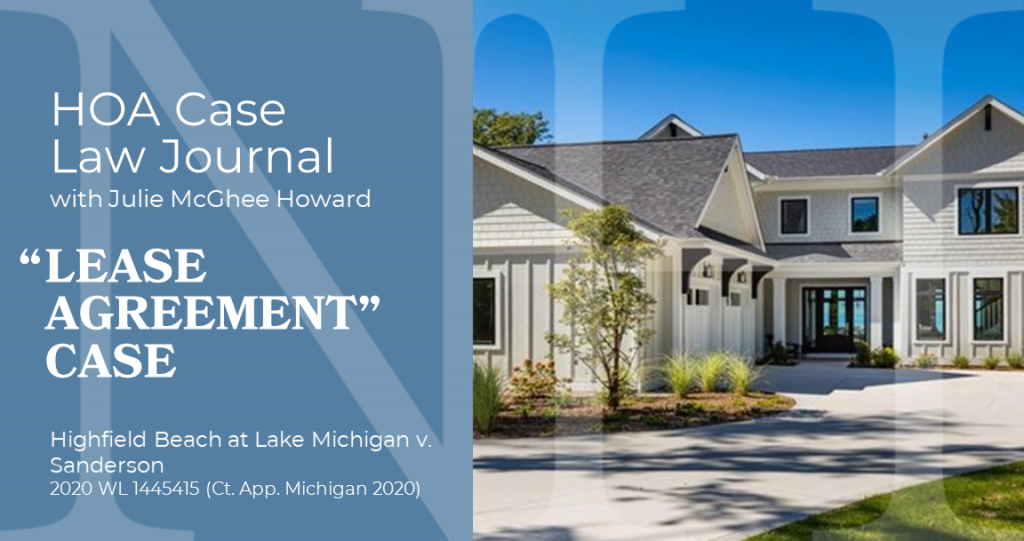HIGHFIELD BEACH AT LAKE MICHIGAN V. SANDERSON
2020 WL 1445415 (CT. APP. MICHIGAN 2020)
HOA RENTAL RESTRICTION
When Leasing Becomes a Problem: A Michigan Appellate Court Case.
As nightly rentals and short-term leasing accelerate in community associations, HOA boards have been challenged to both meet the desires of their individual members while balancing the wishes and interests of their wider communities. It is not uncommon for new, tighter HOA leasing restrictions to be added to an HOA’s governing documents, but when these HOA rental restriction documents are amended, this often gives rise to owner challenges. In Michigan, an appellate case highlights such a challenge a member homeowner made after making significant investments in his property based on the original leasing restrictions in his HOA’s governing documents and his uninformed reliance that those restrictions could not change.
The Facts On HOA Lease Restrictions:
Mr. Sanderson, a member homeowner, bought a lot on Highfield Beach and built a beautiful 5,600 square foot single-family home. In 2015, once the house was completed, Sanderson entered a 15-year contract with a property management company, CRA, to lease the home.
The contract with CRA was titled a “Lease Agreement,” and provided that the management company would lease the home for periods as short as 14 days. The same “Lease Agreement” also stated that Sanderson was leasing his home to CRA for 15 years.
Mr. Sanderson sent the “Lease Agreement” to his HOA’s board of directors and claimed the board approved the contract before he entered it. The “Lease Agreement” incorporated the language of the governing documents at the time that allowed short-term rentals as short at 14 days.
In 2016, the HOA amended its bylaws to prohibit any leases less than 4 months.
Mr. Sanderson and CRA kept renting Sanderson’s house after the amendment was recorded and the HOA filed this suit to enforce the amendment.
The Issue of the Suit:
Mr. Sanderson argued that the HOA could not enforce the 2016 short-term rental amendment against him because of an exception under the governing Michigan statute, prohibiting enforcing leasing restriction amendments against any existing leases. He also counterclaimed for negligence and breach of fiduciary duty for the HOA board of directors failing to record an earlier 2008 amendment to restrict rentals.
Mr. Sanderson argued the HOA waived its right to enforce the short-term rental restriction because the HOA had adopted a similar restriction in 2008 but had never enforced it against him. Mr. Sanderson argued that he would not have bought the property on Highfield Beach, built the house, or entered into the lease agreement with CRA if the board of directors had recorded the earlier amendment with the tighter restriction on short-term rentals. Furthermore, his suit counterclaimed, among other things, a loss of rental income totaling over $1 million.
Court Decision
The Court of Appeals held that the amendment was enforceable against Mr. Sanderson. The Court found that the state law exception for existing lease agreements did not apply here because, despite the name of the agreement, Mr. Sanderson’s contract with CRA was for property management –not a lease for CRA to occupy or use the home.
The Court also held that the current board of directors was not negligent and had not breached its fiduciary duty by failing to record the earlier 2008 amendment. There was no evidence presented that showed the amendment was adopted by the members, and none of the current directors were on the board in 2008. The Court held that, even if the current directors had been on the board in 2008, the directors could not be liable for failing to record an attempted amendment when there was no evidence it was ever approved by the members.
The Cautionary Tale
Although the board of directors and their attorneys prevailed, the experience deeply affected the impacted homeowner and the harmony of the community. In addition to defending the HOA, the board of directors found themselves the subject of a significant counterclaim, magnifying the need for very clear association documentation and records. The lesson learned from this case is that an HOA board must be extraordinarily careful and have a clear understanding of its governing documents, applicable state statutes, and case law and precedent. When in doubt, consult with your community association attorney.
Contact NowackHoward for HOA Law Advice to Help Guide Your Board of DirectorsAt NowackHoward, we focus on condominium association and HOA law throughout Georgia. To learn more about our community association practice and how we can help guide your community, contact one of our attorneys today at (770) 863-8900 or by email at info@nowackhoward.com.


